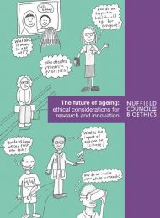The future of ageing: ethical considerations for research and innovation

The Nuffield Council on Bioethics, an independent body that examines and advises on ethical issues arising from developments in bioscience and health, has published the findings of an in-depth inquiry exploring the ethical issues that arise in relation to the role of biomedical research and technological innovation in helping people to live well in old age.
With references to TAPPI, the report identifies the values, principles, and factors that are ethically significant in relation to research that seeks to influence people’s experience of ageing, across these three broad areas:
- Research into biological ageing
- Assistive, monitoring, and communications technologies such as health apps and smart home technologies
- Innovative predictive and diagnostic technologies
They propose an ethical framework to help everyone involved in research and innovation related to ageing think through the ethical implications of their work and to suggest practical and actionable steps for change.
Recognising the influence of the wider research ecosystem on the scope for researchers and others ‘on the ground’ to adopt these approaches, they make 15 recommendations to those with influence on the conduct and publication of research, including the UK Government, research funders, regulators and practitioners. The aim of these recommendations is to help embed an approach that puts the diversity, agency, and value of older adults firmly at the heart of all research concerned with ageing.
